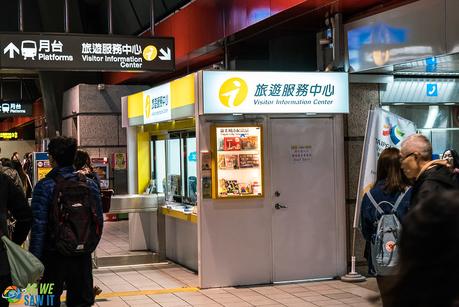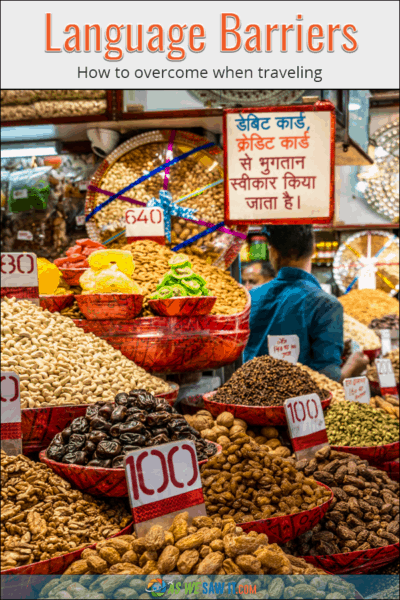Unless your parents were immigrants, you may be among the many people who grew up speaking only one language. Since you're reading this article, we'd guess your language is English. Yet the world is filled with thousands of languages which, for many people, can be intimidating.
As frequent travelers, we can relate to the travel language barrier issue. Speaking from experience, few things are as challenging as not being able to check in at your hotel because no one at reception speaks English. Worse yet if you have dietary limitations, as we do. How can you read the menu? How do you ask the waiter if a dish contains shellfish?
How do you communicate when you don't know the language?
You don't have to be multilingual to travel.
Speaking from personal experience, if you visit popular destinations like Western Europe, the Caribbean, and cruise ports worldwide, you won't have any language problems when traveling. English is so widespread now that almost anywhere where there are Western tourists, there are people who speak some English.
You may also be surprised to learn that many foreign countries, such as Singapore and Malaysia, use English as their main language.
In our experience, there's a better chance of encountering a language barrier when traveling overseas to less-touristed locations, like western China. But people still travel there and come back safely, with wonderful stories to tell.
Recommended reading: 11 Things You Should Know Before You Visit China

A little foreign language goes a long way
Even if you didn't learn French or Spanish in school, you probably know what merci and si mean. Almost everyone is able to learn a few phrases or, at the very least, a few words to help them get by when traveling.
After all, we are guests in their country. The least we can do is to try learn some of the language as well as the country's etiquette. This not only shows locals that you are trying your best, but they may also be more willing to help you out. Even better, you may even make a friend or two along the way!
Also read: 17 Things to Prepare Before Traveling Abroad: A ChecklistBasic foreign language phrases to learn before traveling
Generally speaking, the most important phrases are:
One of the best tricks we've heard is to ask your hotel for a business card and carry it with you. It will come in handy if you get lost. It will also help bus drivers and taxi drivers know where you want to go.
Another good idea is to learn how to pronounce the names of the places you want to travel to. If you are worried that you will forget the words or phrases, make a note in a notebook or on your phone for quick reference.

Tip: It is always useful to get your hands on a good old-fashioned travel guide like the ones produced by Lonely Planet. These are always full of lists of common phrases as well as maps and travel information.
Just do your best
Relax. The first thing to remember is not to be too shy or embarrassed about your feeble attempts. People are incredibly forgiving and appreciate anyone trying to speak a few words of their language. Remember that the locals probably have to try speaking English and it is just as tricky and embarrassing for them too.

All travelers and locals can ask of one another is that they try.
Don't take yourself too seriously
Most of all, you need to hold onto your sense of humor. Chances are that you will make some mistakes or sound a little silly.
Sometimes the locals will laugh at your attempts. Don't take it personally. In some cultures, laughter is used to help someone avoid embarrassment or "losing face." The proper response is to laugh along with them.

It's also okay to ask them to correct you. The goal is to learn from your mistake.
Remember to be polite

How often have you been traveling and heard someone say, "Doesn't anybody speak English around here?" As a tourist, you are a guest in their country, so it is very important to remain polite and pleasant. It would be totally obnoxious and ignorant to expect absolutely everyone to speak your language.
Be patient

When trying to communicate with someone who does not speak English or does not speak it well, it is easy to get frustrated, but this is not their fault. Be patient and if they are struggling with their English, politely try and help them as most will appreciate the opportunity to improve their English.
Do your research
Research the culture and the local etiquette. By finding out how to correctly greet someone or how to convey respect, you may find that locals are more obliged to communicate with you. It is also important to find out what hand signals or gestures to avoid as many cultures, especially in Asia, some seemingly meaningless Western hand gestures are considered rude or offensive.

It would also be wise to research the country and find out what language is spoken. Perhaps there is more than one language, in which case it would be good to find out what regions speak what language. For example, in China some regions are predominantly Mandarin-speaking while others are predominantly Cantonese-speaking.
Pick up on local mannerisms

Once you arrive at your destination, take time to listen to the words people use in day-to-day conversations. Often language learned off the internet or from a book is very formal and it may be useful to learn the more conversational phrases. Consider, for example, the contexts in which we use 'Thank you very much' and just 'Thanks'.
Keep it simple
Chances are that you will find someone who speaks some broken English and you will be able to ask them for help or information. When talking to someone who is not a native English speaker, it is essential to keep your sentences short and concise.

Use simple language and avoid slang as this can cause confusion. Choose your words carefully and be mindful of what words are more commonly used internationally. For instance, "toilet" may not be the most delicate or eloquent word, but your one-word question is clear. It's also much easier to understand than "do you have a bathroom" or "where is the restroom."
Avoid the confusion
Try to avoid speaking too loudly or being overly descriptive. This may seem like the logical way to get your message across, but it can confuse the listener or come across as aggressive.

Another mistake many travelers make is to speak too slowly. There is a fine line between talking clearly and at a pace that allows the listener to process the words. Besides, speaking too slowly can sound condescending.
Use non-verbal cues
If all else fails, mime it out! Using hand gestures can often help get the message through. You can also use your face to convey a message. For example, if someone is trying to help you but they are speaking too fast or you do not understand them, look confused and quizzical so they know to slow down and try again.
This works both ways, too. You may not understand how to get to the toilet, but when he points you'll quickly figure out where to go.

Keep a pen and a notebook in your backpack. It can be useful to have around when asking for directions as some locals may draw out a rough map for you. These are extremely useful and make lovely mementos.
Use technology
Thankfully, we also have technology on our side! It is the 21st century after all, and with that comes a myriad of apps and technology that can help you communicate when you travel. These days there are loads of apps and sites that can help us translate along the way.
The number one app to get, for both Android and iOS users, is Google Translate. Not only can you type in a phrase, translate it and then get the app to speak the translated phrase for you, but you can also decipher signposts and other writing you may not understand.
Tip: If you would like to learn some phrases before traveling, try out Duolingo. This free site allows you to learn phrases in almost any language.
Your phone is definitely your best friend when traveling to a non-English speaking country.
- Download maps for both your and your taxi drivers' use.
- Take pictures of your hotel or your street so that you can show someone when asking for directions.
- You can also pre-download pictures of the attractions you would like to visit for the very same purpose.
The chances of you visiting a country where absolutely nobody speaks English are very slim, however it is always fun to try new things. So, learn a few phrases in a new language just for fun. You know what? You may even find that you actually do have a talent for languages after all!

Written by Linda
Linda is multilingual and has been to over 50 countries. Her insatiable love of travel, cuisine, and foreign languages has inspired her to create As We Saw It with her husband Dan, a professional photographer. Her goal is to make travel easier for others and to offer a brief escape to another land.

